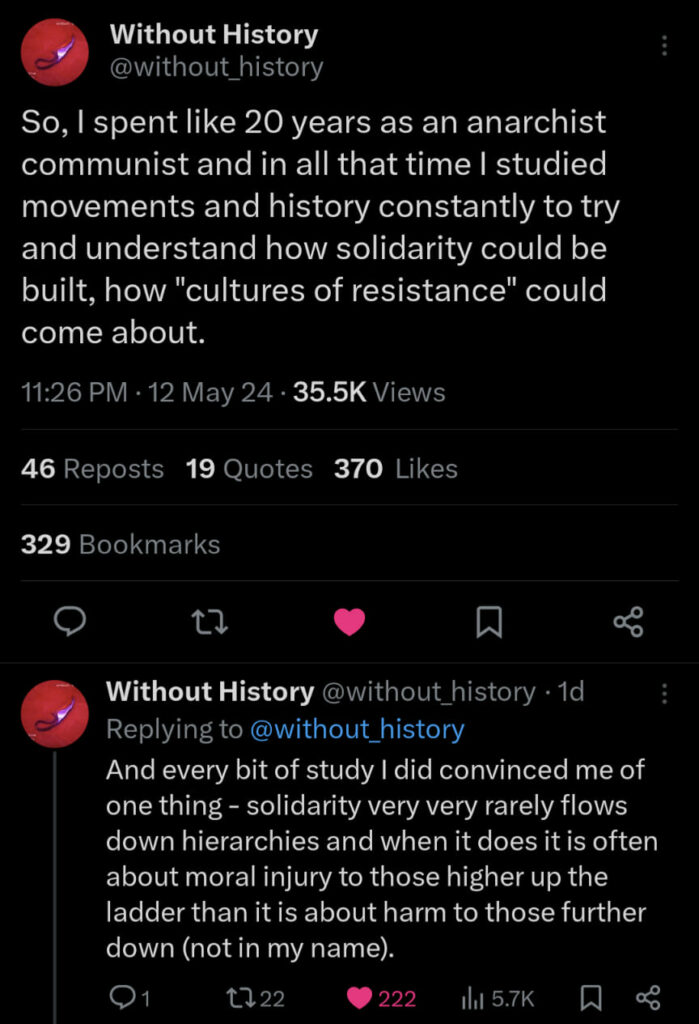
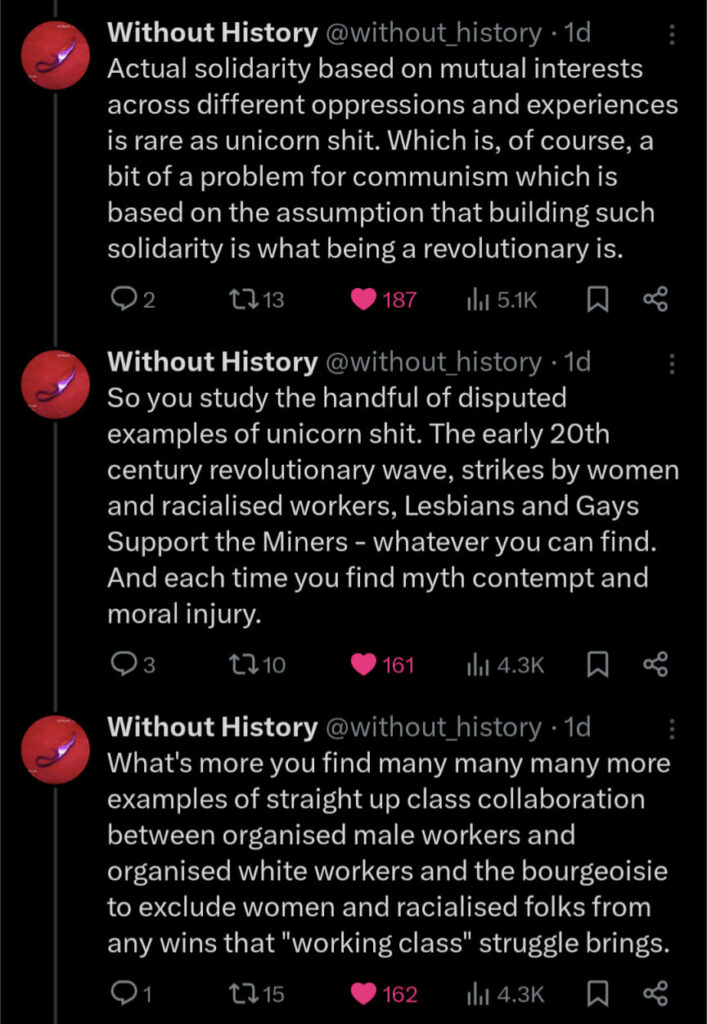
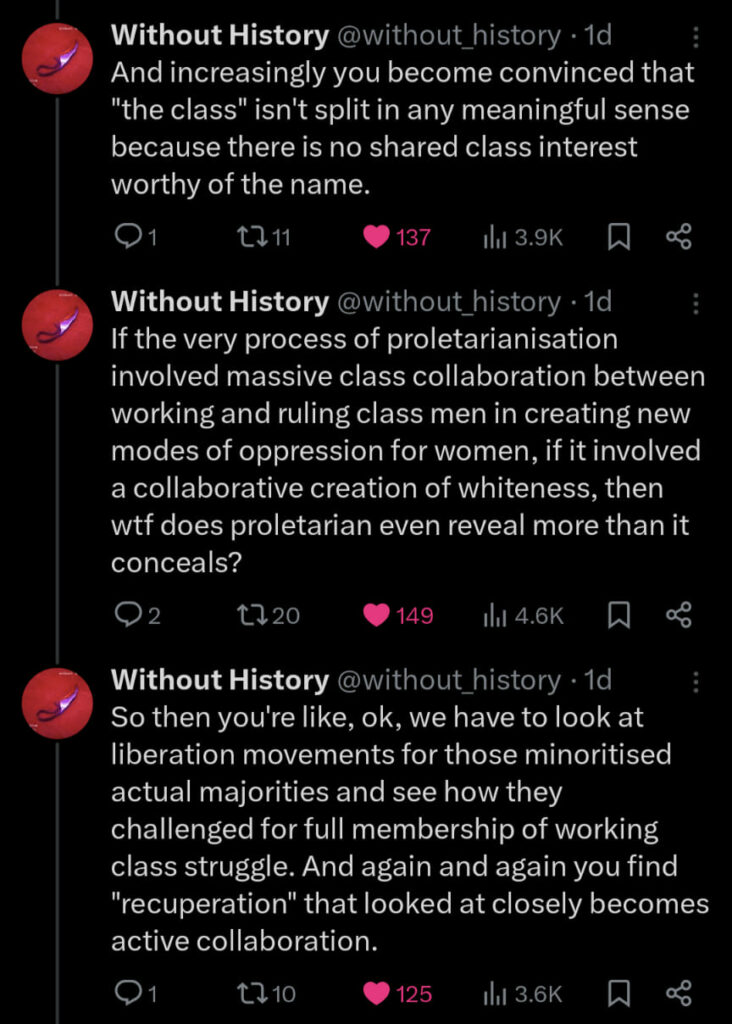
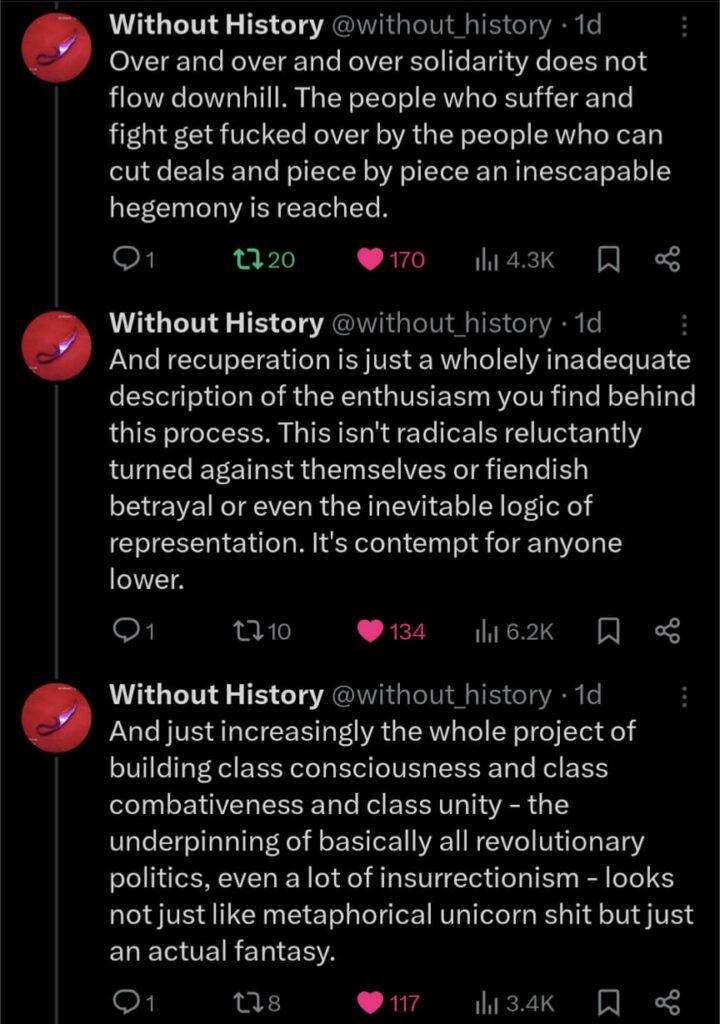
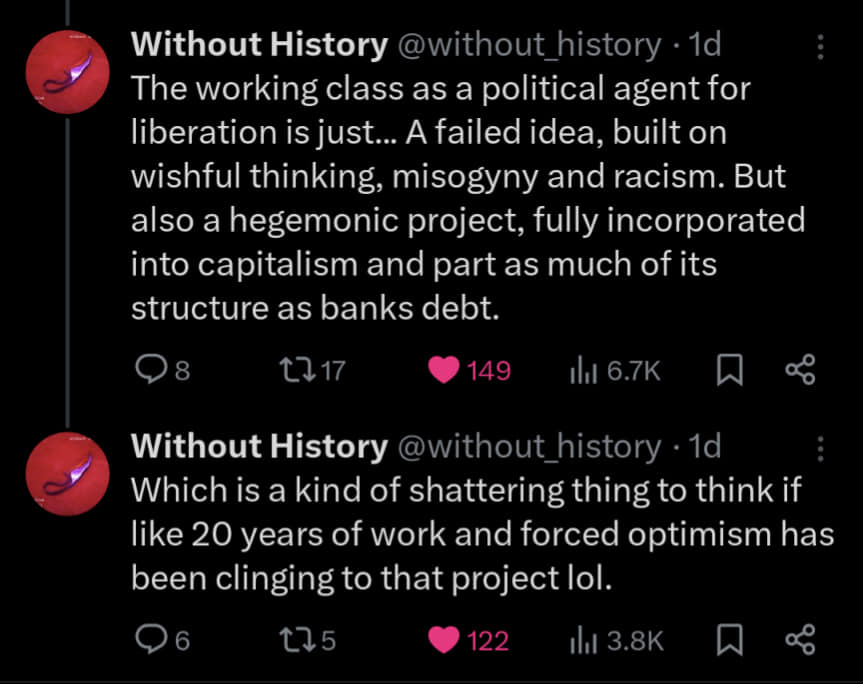
I posted this thread in my stories on Instagram and got a bunch of DMs about it but I wasn’t in the brain space when I posted it to provide commentary. I attempted the day after and this is what I wrote:
I think this thread is making me re-examine what my mental picture of revolution even is. It seems intuitively obvious the idea that solidarity doesn’t flow through hierarchical structure bc I also know enough history to know that when certain groups are offered a slice of the pie of the elite (or even a vague offer that they can smell it) that there are countless examples of solidarity being sabotaged this way.
(Also- if you haven’t watched it, the 1983 documentary Seeing Red is an excellent movie that thoroughly dives into the communist movement of the early 20th century and how essentially authoritarianism was it’s greatest downfall. I watched it on Kanopy 4 years ago it might still be on there I’m not sure. I’ve also seen it on YouTube)
My idealistic mental picture of how to build solidarity for revolution in some ways has been that people will finally realize how much we have in common in contrast to the ruling class and all of the divisions of race and gender etc will come crashing down and we will unite etc etc.
That’s not really my full story tho bc I have read enough and been exposed enough to diverse perspectives that I understand there are so many ways it could look to get to some place better.
For example prefigurative politics are a huge piece of how I see revolution coming about . Actually I think from the lens of prefigurative politics we can see revolution already unfolding. This obviously isn’t some ground breaking original thought but like when you read history books it can give the impression that there are clear moments when revolution erupts, as if it’s this clearly defined thing that everyone knows is ~the moment~ but when you’re in the midst of historical events (as we undeniably are now) you don’t really see it that way. It’s a nebulous unfolding of events from day to day, month to month, year to year even. In which case I think we could easily see something like the occupy movement as a precursor or start point even.
With prefigurative politics, the groundwork for a new world is something we lay down regardless of the status of the powers that be. We are watching the society we knew (or maybe thought we knew) crumble before our eyes. We are living in a fascist police state and that reality has been obscured from us for a long time, now the facade has fallen.
In the meantime, some of us have known that fact before others. New ideas and ways of relating and self-governing have been emerging, are being tested and lived. Some in more formal structures and some in more casual networks of mutual aid and solidarity. These are what will survive even as the state’s usefulness to the survival of us as common people erodes.
Anyways all of that is just to say that my imagination of revolution has been varied. I see many ways things could come to be and I think that variability is actually more reflective of reality than any single solution flaunted as ~the one~. Different contexts call for different tactics.
When it gets down to it I believe the human spirit is deeply resourceful, adaptive, and driven towards survival and perpetuation of itself. We find a way. And I think that recognizing The pitfalls of a strategy that has been flaunted as ~the one~ by many is incredibly important if we want to find solutions to those pitfalls.
I (obviously if you have been following me awhile) believe hierarchy is antithetical to true freedom. I also can’t say with full certainty that I believe non-hierarchical structures are necessarily effective or don’t have a lot of pitfalls of their own. I think there are many creative ways people have been imagining and experimenting to get around that, even just re-framing goals (for instance I often hear people complain about consensus processes as being too cumbersome and slow- completely valid- but maybe we can examine what sorts of decisions need quick responses and where we can slow down and challenge the capitalist value of speed and efficiency in exchange for the slowness necessary to develop good and solid relationships and foundations).
(as a side note- the Andrewism video I shared the other day on how anarchy works has been floating around in my brain and making me seriously rethink how necessary something like formal structures for consensus and direct democracy actually are for a non-hierarchical society)
Coming to the thing that resonated most with me about that thread though: my experience exploring cancel culture. While there are several facets to my critiques of cancel culture (and my critiques of critiques of cancel culture lmao), one thing that I really firmly believed was that unchecked cancel culture dynamics posed a threat to the building of movements of solidarity. And I mean it kind of does. Particularly paired with creeds of epistemic deference, essentialism, the bastardization of “believe survivors” from being about survivor support in immediate crisis to being about doing away with due process, etc.
But that thread challenges the idea that such solidarity is even truly possible, and unfortunately observing the way critique of cancel culture played out in reality it kind of proves that point.
I genuinely did see apologia for fascism, I witnessed what to me appeared to be obsession with clout and validation that came from being “reasonable” /neutral/apologetic and friendly, some even straight up adopting right wing stances. I watched people say “people are going to hate me for saying this! I don’t care if you unfollow” while their platforms exploded. Meanwhile I maintained many positions I see as crucial to true liberation, even as they parted from “party lines” at the time and genuinely lost a lot of followers. It wasn’t fun but I really wasn’t about to pay for clout with my integrity. If that was the cost, that was the cost.
I can’t know for sure but from an outsider who was once an insiders perspective, a lot of it seems like clout brain worms. Also from a behind the scenes perspective I saw how ppl were saying one thing but doing something completely different in practice.
The thing is that to build real mass solidarity like that assumes that people are operating from the same mutual investment and integrity and good faith, and that’s just not reality.
Something I’ve heard a lot of anarchists say (myself included bc I really believe this) is that a lot of statists see themselves as at the top of the hierarchy (or aspire to be). They see themselves as the leaders.
Maybe not all, and I’m attempting to say this in the most neutral way possible: humans are wired to seek validation. Validation feels good. The admiration and power that comes with that kind of leadership is alluring. That’s why I’m not going to sit here and lie and say losing followers didn’t suck a lot. It hurt, I hated it. But I also know as a human how validation brained I am. I’ve spent a LOT of time thinking, writing about, and exploring validation and power and the things we do to get it and how easily we can become disconnected from our integrity in the process. Which gave me an advantage when it happened to me. I knew about it and I knew where those feelings were coming from. I also knew how important it was to soothe myself and self-validate because the positions I was defending, the things I refused to give up about myself, were deeply entwined with my integrity. I could have a growing platform during a time when fascist aligning gender critical stances were booming OR I could have integrity to myself as non-binary and to all trans people and particularly children as people worthy of sovereignty of self. I couldn’t have both though.
This is why I push so hard for differentiation. It’s why I wrote my manifesto and the follow up to it. Because I really believe a world without hierarchy is possible. But I also believe it is foremost cultural and impossible without prefiguration.
This is why I feel sympathetic to diverse leftist tendencies and think many tactics are necessary to address the crisis of fascist capitalism we find ourselves in.
The world of horizontal power is possible but to do it right is a slow process. We need a culture that is deeply aware of power and the human psyche. We need a culture that knows the dance between autonomy and cooperation and how to reconcile them when they are at odds.
Power has a strong corruptive force on the psyche. Clout and validation the same. This is why you can look at any hierarchical organization ever, spin around in a circle and point to one and you’ll see how even one individual chasing power can sabotage an entire organization.
When power is distributed, it is much harder to completely undermine it.
Not impossible! But harder.
Anyways this is all a very long way to say that thread has me thinking a lot about what solidarity looks like and what is truly possible. I don’t think it’s as fatalist as it sounds, I think it’s an opportunity to re-examine tactics, make peace with the way the human psyche and flows of power tend to operate, and figure out a new approach.
